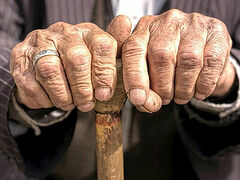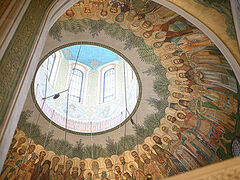It is just an hour’s drive from Tbilisi to Samtavro Convent. Vakhtang, my good friend who took upon himself the work of Georgian hospitality, proclaimed: “To be in Georgia and not to visit St. Gabriel (Urgebadze) does not befit a Russian. Get in the car quickly!”
Vakhtang wisely managed to avoid communication in the style of enthusiastic portrayal of various miracles, i.e., “I can tell you about a miracle—it’s terrific! And there was an even more interesting one—you’ll be blown away!” But there was no unhealthy rush for unverified miracles. My hospitable friend told me about a peculiar miracle of the demon of drink.
“We are going to St. Gabriel now—let’s recall one of his brightest and most formidable instructions: ‘Even if you see a murderer, a harlot or a drunkard lying on the ground, do not judge anyone. God has given them the reins, but He is still holding yours. If he gives you the reins too, you may find yourself in a worse situation by committing the sins you are judging them for, and perish.’
“Tbilisi is a relatively small city where almost everyone knows each other and treats one another as their kin. In the 1990s, a man named George lived in a district of Tbilisi. He was homeless and drank heavily. He would spend nights on a cardboard box between the garages, and when it rained—under a wooden table in the area where old people played chess or drank wine in the evenings. No one tried to drive him away—they either pitied him or condescendingly despised him, not allowing themselves to descend to swearing. The market women from the crossroads who sold some pigswill had known him for a long time, and sometimes they gave him alcohol on credit until he brought alms he’d collected somewhere.
“Few knew the story of how he became a desperate vagabond. A few years earlier, his wife brought into the house another man who ‘knew how to earn money’ and kicked George out of his own home. He could not cope with the shock and betrayal. The inoffensive, quiet wino, embarrassed and ashamed of himself, became a familiar part of the city landscape.
“Once I happened to pass by the courtyard where George lived. Our eyes met. He asked me, a stranger, ‘Rogorohar, bijo?’ (‘How are things, ol’ fellow?’). I replied, ‘Kargat, madlob’ (‘Fine, thanks’). I looked closer at him, and there was so much pain in his eyes—you woudn’t believe it! I decided to put aside all my affairs for the day and spend the day with this sufferer, finding out more about him. I felt that he wanted to talk about his life and get rid of his suffering, and that he was tormented by shame. You will ask how I was going to talk to him. Of course, in Georgian: I went to the saleswomen at the crossroads, took their drink, returned to the courtyard, seated George at ‘his’ dinner table, and we began a long conversation.
“That conversation turned into the real confession of a suffering man. He told me not only the terrible story of betrayal, but also other, no less terrible stories. There was also his brother—a murderer whom George had to hide, and much more. As it turned out, George had not known anything about Christ; he might have heard of Him, but he believed references to Jesus to be no more than folklore. However, he did feel an interest—not even interest, but an inquisitive question, ‘What if all this is true? What if Christ not only exists, but also really loves me?’ When George heard that I took God seriously, he laughed with relief, ‘Then everything is not so bad, is it? It turns out that Christ exists?’ Then he began to tell me about his sins. I got agitated:
‘Don’t tell me about your sins—I have enough of my own! Tell them to God in front of the priest, ask Christ’s forgiveness.’
‘Will He forgive me?’
‘What do you think He came for?’
‘Yes, it means that He really exists. You know, I want to go to Him. Never mind that I stink—I want to talk to Him.’
“Christ did not always speak, in His own words, with people that smelled like Chanel perfume. I called my childhood friend, Fr. David Kvlividze, ‘Fr. David, I’m sorry about calling you so late. George would like to get baptized.’ ‘Which George? Ah, that very George! Wonderful. Let him come to our church in a couple of days. But Vakhtang… Make sure that…’ ‘I’ll make sure that He doesn’t drink. He will come sober.’ So we agreed with George that for several days he would not drink and would think carefully about what he wanted to say to God.
“During the following days, my new friend was unrecognizable—looking solemn, mysterious and inspired, he approached the old men at the table in the courtyard, the saleswomen in the market and, like a herald, reported that ‘Soon, very soon I am going to God—I’ll be baptized!’ The old men shook his hand, and the saleswomen, seeing that their former ‘customer’ was busy with completely different things, were amazed. Someone even wiped away a tear, gazing after George as he was moving away with an unusually firm gait, ‘Miracles do happen in this world. Thank God.’
“His Baptism took place. The next day I decided to visit George. But I found him neither in the courtyard nor beside the garages—I saw only the old men discussing something at their table. They beckoned me to them, saying,
“‘Our George died this morning. The ambulance took him away. Yesterday he came from church, went to sleep, and the next morning he was dead.’
“I stood stock-still. Such a righteous death. Yesterday this man consciously came to God, Christ forgave him all his sins, and today he, clean, sober and in bright robes, has departed to Him. And who am I to judge George, calling him a ‘dissolute, homeless drunkard?’ True, if even a tiny bit of the trials that he endured were to befall me, what would I become? St. (Urgebadze) was right to say, ‘The Lord shows us someone else’s misfortune in order to soften our hearts.’ By the way, here is Samtavro. We have arrived at the destination.
“There was something to be silent about when visiting St. Gabriel. And there was something to meditate on.”




